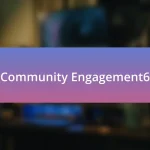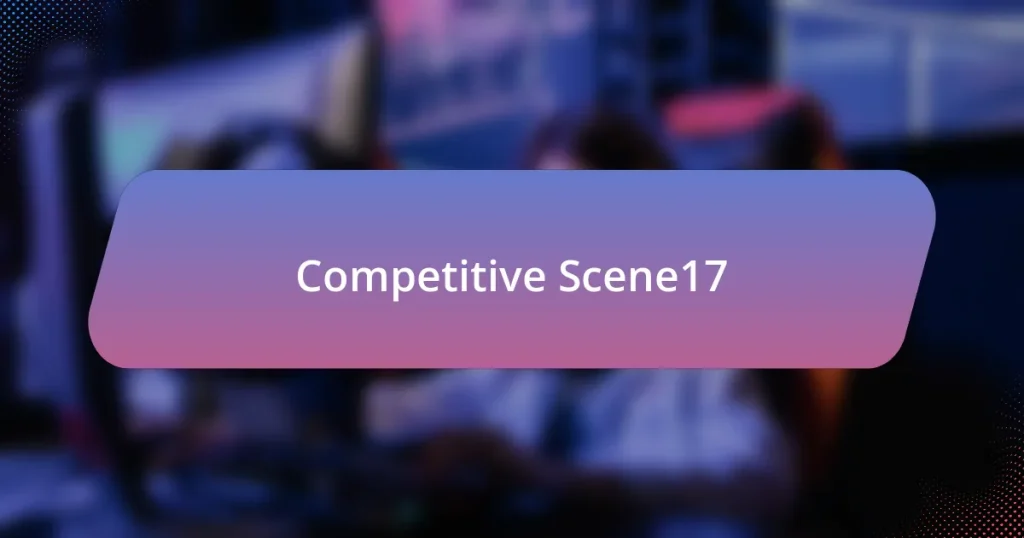Dota 2 esports has profoundly influenced global gaming communities by fostering collaboration, community engagement, and a sense of belonging among players. The game has elevated the perception of esports as a legitimate career path, exemplified by its premier tournament, The International, which has attracted millions of viewers and generated substantial prize pools. This cultural impact is reflected in the normalization of gaming as a spectator sport, the promotion of diversity and inclusion, and the economic benefits derived from sponsorships and local events. Additionally, Dota 2’s role in shaping community identities and social dynamics highlights its significance in the broader context of gaming culture.

What is the Cultural Impact of Dota 2 Esports on Global Gaming Communities?
Dota 2 esports has significantly influenced global gaming communities by fostering a sense of belonging and collaboration among players. This impact is evident in the formation of diverse online communities, where players from various backgrounds engage in discussions, share strategies, and participate in tournaments. The International, Dota 2’s premier tournament, has attracted millions of viewers and generated substantial prize pools, exemplifying the game’s ability to unite fans and players worldwide. Furthermore, Dota 2 has contributed to the growth of esports as a legitimate career path, inspiring many to pursue professional gaming. This cultural shift is supported by the increasing number of esports events, sponsorships, and media coverage, highlighting Dota 2’s role in shaping the future of competitive gaming.
How has Dota 2 influenced the perception of esports in gaming communities?
Dota 2 has significantly elevated the perception of esports within gaming communities by showcasing competitive gaming as a legitimate and respected form of entertainment. The game’s annual tournament, The International, has set records for prize pools, reaching over $40 million in 2021, which has drawn mainstream attention and legitimized esports as a viable career path for players. This visibility has fostered a growing acceptance of esports among traditional gaming audiences, leading to increased participation and viewership. Furthermore, Dota 2’s complex gameplay and strategic depth have contributed to a perception of esports as a skill-based competition, akin to traditional sports, thereby enhancing its cultural status within the broader gaming community.
What cultural shifts have occurred due to the rise of Dota 2 esports?
The rise of Dota 2 esports has led to significant cultural shifts, particularly in the normalization of gaming as a legitimate career path. This shift is evidenced by the emergence of professional players who earn substantial incomes, with top players reportedly making millions through tournaments and sponsorships. Additionally, Dota 2 has fostered a global community, breaking geographical barriers and promoting cross-cultural interactions among players and fans. Events like The International, which boasts multi-million dollar prize pools, have transformed gaming into a spectator sport, attracting diverse audiences and elevating the status of gamers in society. Furthermore, the rise of streaming platforms has enabled players to share their experiences, creating a culture of content creation and community engagement that further solidifies gaming’s place in modern entertainment.
How do different regions perceive Dota 2 esports culturally?
Different regions perceive Dota 2 esports culturally in distinct ways, influenced by local gaming traditions, community engagement, and economic factors. In Southeast Asia, for instance, Dota 2 is deeply integrated into the social fabric, with large-scale tournaments like The International drawing massive local audiences and fostering a sense of community. In contrast, Western regions often view Dota 2 through a more commercial lens, focusing on professionalization and sponsorship, which reflects a broader trend in esports as a legitimate career path. Additionally, in China, Dota 2 is not only a popular game but also a cultural phenomenon, with significant government support and a dedicated fanbase that celebrates players as celebrities. These regional differences highlight how cultural values and economic conditions shape the perception and significance of Dota 2 esports within various communities.
Why is Dota 2 significant in the context of global gaming culture?
Dota 2 is significant in the context of global gaming culture because it has established itself as a leading title in the esports industry, influencing competitive gaming and community engagement worldwide. The game has a massive player base, with over 10 million monthly active users, and hosts The International, which is one of the largest esports tournaments, offering prize pools exceeding $40 million. This financial investment and viewership have elevated Dota 2 to a cultural phenomenon, fostering a dedicated community and inspiring numerous tournaments globally. The game’s mechanics and strategic depth have also contributed to its status, making it a benchmark for other multiplayer online battle arena (MOBA) games.
What role does Dota 2 play in shaping community identities?
Dota 2 plays a significant role in shaping community identities by fostering collaboration, competition, and shared experiences among players. The game’s emphasis on teamwork and strategy encourages players to form bonds and develop a sense of belonging within their respective communities. For instance, Dota 2’s global tournaments, such as The International, not only showcase top-tier gameplay but also create a shared cultural narrative that unites fans and players across different regions. This phenomenon is supported by the fact that Dota 2 has millions of active players worldwide, with diverse communities forming around local teams and players, thus reinforcing local and global identities.
How does Dota 2 contribute to the evolution of gaming as a cultural phenomenon?
Dota 2 significantly contributes to the evolution of gaming as a cultural phenomenon by establishing a robust esports ecosystem that fosters global community engagement and competitive spirit. The game has popularized live streaming and professional tournaments, exemplified by The International, which has awarded over $40 million in prize money since its inception in 2011, attracting millions of viewers worldwide. This financial investment and viewership have elevated gaming to a spectator sport, influencing mainstream media and entertainment. Furthermore, Dota 2’s complex gameplay and strategic depth have encouraged collaboration and communication among players, creating a shared culture that transcends geographical boundaries. The game’s impact is evident in the rise of dedicated fanbases, content creation, and the integration of gaming into social interactions, solidifying its role in shaping modern digital culture.
What are the social implications of Dota 2 esports on gaming communities?
Dota 2 esports significantly influences gaming communities by fostering social interaction, collaboration, and competition among players. The competitive nature of Dota 2 encourages teamwork and communication, as players must coordinate strategies to succeed, leading to the formation of friendships and social networks. Additionally, the global reach of Dota 2 esports events, such as The International, creates a shared experience for fans and players alike, promoting a sense of belonging within the community. Research indicates that participation in esports can enhance social skills and provide a platform for cultural exchange, as diverse players engage with one another across different regions and backgrounds. This interaction not only strengthens community ties but also contributes to the overall growth of the gaming culture, making Dota 2 a pivotal element in shaping social dynamics within gaming communities.
How does Dota 2 foster community engagement and interaction?
Dota 2 fosters community engagement and interaction through its robust multiplayer platform, which encourages teamwork and communication among players. The game features integrated voice and text chat systems, allowing players to strategize and build relationships during matches. Additionally, Dota 2 hosts regular tournaments, such as The International, which not only attract global viewership but also create opportunities for fans to engage through live events, forums, and social media discussions. The game’s open-source nature allows for the creation of custom games and mods, further enhancing player interaction and community creativity. These elements collectively contribute to a vibrant community that actively participates in discussions, content creation, and competitive play, reinforcing Dota 2’s status as a central hub for esports engagement.
What impact does Dota 2 have on social dynamics within gaming communities?
Dota 2 significantly influences social dynamics within gaming communities by fostering collaboration, competition, and social interaction among players. The game’s team-based structure requires players to communicate and strategize effectively, which enhances teamwork skills and builds relationships. Additionally, Dota 2’s esports scene creates a shared culture around tournaments and events, encouraging community engagement and camaraderie among fans and players alike. Research indicates that participation in Dota 2 can lead to the formation of friendships and social networks, as players often connect through online platforms and local meetups, reinforcing social bonds within the gaming community.
How does Dota 2 esports connect with other cultural elements?
Dota 2 esports connects with other cultural elements through its integration of music, art, and community engagement. The game features original soundtracks and collaborations with artists, enhancing the gaming experience and creating a cultural resonance beyond gameplay. Additionally, Dota 2’s vibrant art style and character design draw inspiration from various mythologies and cultures, fostering a diverse aesthetic appreciation. Events like The International not only showcase competitive play but also serve as cultural festivals, bringing together fans from different backgrounds, thus reinforcing community bonds and cultural exchange. This multifaceted connection illustrates how Dota 2 esports transcends mere gaming, becoming a platform for cultural interaction and expression.
What collaborations exist between Dota 2 and other cultural industries?
Dota 2 has collaborated with various cultural industries, notably through partnerships with music, film, and fashion. For instance, the game has featured music from artists like Skrillex and has included in-game items inspired by popular culture, such as the “Dota 2 x The International” merchandise line that showcases collaborations with renowned fashion brands. Additionally, Dota 2 has been referenced in films and television, highlighting its influence beyond gaming. These collaborations demonstrate Dota 2’s integration into broader cultural contexts, enhancing its visibility and appeal across different audiences.
How does Dota 2 reflect or challenge societal norms and values?
Dota 2 reflects and challenges societal norms and values through its diverse character representation and competitive nature. The game features a wide array of heroes from different cultures, promoting inclusivity and representation, which aligns with contemporary societal values that emphasize diversity. For instance, characters like Windranger and Templar Assassin showcase female empowerment in a traditionally male-dominated genre, challenging gender norms within gaming. Additionally, the competitive aspect of Dota 2 fosters teamwork, strategic thinking, and sportsmanship, which are values that resonate with societal expectations of collaboration and fair play. The game’s global tournaments, such as The International, further highlight the importance of community and collaboration across cultures, reinforcing the idea that gaming can unite individuals from various backgrounds.

What are the economic impacts of Dota 2 esports on gaming communities?
Dota 2 esports significantly boosts the economic landscape of gaming communities by generating revenue through sponsorships, merchandise sales, and tournament prize pools. For instance, The International, Dota 2’s premier tournament, has consistently offered multi-million dollar prize pools, with the 2021 event reaching over $40 million, which directly benefits local economies through increased tourism and local business engagement. Additionally, the presence of major sponsors like Intel and Red Bull enhances financial inflow into these communities, fostering job creation in event management, broadcasting, and content creation. This economic stimulation not only supports existing businesses but also encourages the growth of new enterprises within the gaming ecosystem.
How does Dota 2 esports contribute to local economies?
Dota 2 esports contributes to local economies by generating significant revenue through events, tourism, and job creation. Major tournaments, such as The International, attract thousands of attendees, boosting local hospitality and retail sectors. For instance, The International 2018 in Vancouver generated an estimated $20 million in economic impact, benefiting hotels, restaurants, and transportation services. Additionally, esports events create jobs in event management, marketing, and broadcasting, further stimulating local employment opportunities.
What are the financial opportunities created by Dota 2 esports events?
Dota 2 esports events create significant financial opportunities through sponsorships, advertising, ticket sales, and merchandise. Major tournaments like The International have prize pools exceeding $40 million, attracting global sponsors such as Intel and Red Bull, which invest heavily in marketing and brand visibility. Additionally, ticket sales for live events contribute millions to the overall revenue, while merchandise sales, including team jerseys and in-game items, further enhance financial gains. The combination of these revenue streams illustrates the lucrative nature of Dota 2 esports, making it a vital component of the gaming industry’s economic landscape.
How do sponsorships and partnerships affect the Dota 2 esports ecosystem?
Sponsorships and partnerships significantly enhance the Dota 2 esports ecosystem by providing financial support, increasing visibility, and fostering community engagement. Financial backing from sponsors allows tournament organizers to offer larger prize pools, which attracts top-tier teams and players, thereby elevating the competitive standard of the game. For instance, The International, Dota 2’s premier tournament, has seen prize pools exceeding $40 million, largely due to sponsorship contributions.
Moreover, partnerships with brands and organizations help in marketing and promoting events, leading to greater audience reach and engagement. This increased visibility not only benefits the sponsors through brand exposure but also strengthens the overall community by creating a more vibrant and active esports scene. Additionally, collaborations with gaming hardware companies enhance the player experience through better equipment and technology, further enriching the competitive landscape.
In summary, sponsorships and partnerships are crucial for the growth and sustainability of the Dota 2 esports ecosystem, driving financial investment, enhancing visibility, and fostering community involvement.
What role do streaming platforms play in the cultural impact of Dota 2?
Streaming platforms significantly enhance the cultural impact of Dota 2 by providing a global stage for gameplay, community interaction, and content creation. These platforms, such as Twitch and YouTube, facilitate real-time broadcasting of matches, allowing millions of viewers to engage with the game and its players, thereby fostering a shared cultural experience. For instance, during The International, Dota 2’s premier tournament, viewership on Twitch often exceeds several million concurrent viewers, illustrating the game’s widespread appeal and community engagement. Additionally, streaming platforms enable content creators to produce tutorials, commentary, and entertainment related to Dota 2, further enriching the game’s cultural landscape and contributing to its status as a significant esports title.
How has the rise of streaming influenced Dota 2’s popularity?
The rise of streaming has significantly enhanced Dota 2’s popularity by providing a platform for players to showcase their skills and engage with a global audience. Streaming services like Twitch have allowed professional players and content creators to broadcast their gameplay, attracting millions of viewers and fostering a community around the game. For instance, during The International 2021, Dota 2 reached over 2.7 million concurrent viewers on Twitch, highlighting the game’s massive appeal. This visibility not only promotes the game but also encourages new players to join the community, thereby increasing its player base and overall engagement.
What cultural trends have emerged from Dota 2 streaming communities?
Cultural trends that have emerged from Dota 2 streaming communities include the rise of interactive entertainment, community-driven content creation, and the normalization of esports as a legitimate form of entertainment. Interactive entertainment is exemplified by the use of live chat features, where viewers engage with streamers and each other, creating a participatory culture. Community-driven content creation is evident in the proliferation of fan art, memes, and highlight reels, which enhance community identity and connection. The normalization of esports is reflected in the increasing viewership numbers, with platforms like Twitch reporting millions of viewers for Dota 2 tournaments, indicating a shift in perception towards esports as a mainstream entertainment option.
How does Dota 2 esports promote diversity and inclusion in gaming?
Dota 2 esports promotes diversity and inclusion in gaming by actively supporting a wide range of players from various backgrounds and cultures. The game’s international tournaments, such as The International, feature teams from different countries, showcasing diverse talent and fostering cross-cultural interactions. Additionally, initiatives like the Dota 2 Community Tournament program encourage grassroots participation, allowing underrepresented groups to compete and gain visibility. The presence of female players and teams in Dota 2 esports, supported by organizations like Women in Games, further enhances inclusivity. These efforts contribute to a more equitable gaming environment, as evidenced by the increasing representation of diverse players in major tournaments and the growing support for initiatives aimed at promoting inclusivity within the gaming community.
What initiatives exist within the Dota 2 community to support underrepresented groups?
The Dota 2 community has several initiatives aimed at supporting underrepresented groups, including the “Dota 2 Women’s League” and “Dota 2 Diversity Initiative.” The Dota 2 Women’s League provides a competitive platform specifically for female players, fostering inclusivity and representation in esports. The Dota 2 Diversity Initiative focuses on promoting diversity within the community through events, mentorship programs, and partnerships with organizations that advocate for underrepresented groups in gaming. These initiatives are designed to create a more equitable environment and encourage participation from diverse backgrounds, thereby enhancing the overall cultural impact of Dota 2 esports on global gaming communities.
How does Dota 2 address issues of toxicity and promote positive behavior?
Dota 2 addresses issues of toxicity and promotes positive behavior through a combination of reporting systems, matchmaking improvements, and community engagement initiatives. The game features a robust reporting system that allows players to report toxic behavior, which is then reviewed by moderators. This system is complemented by a matchmaking algorithm that aims to pair players of similar skill levels and behavior scores, reducing the likelihood of negative interactions. Additionally, Dota 2 encourages positive behavior through rewards for good conduct, such as commendations that can enhance a player’s profile. These measures collectively contribute to a healthier gaming environment, as evidenced by the reduction in reported toxicity levels following the implementation of these systems.

What are the future implications of Dota 2 esports on global gaming communities?
The future implications of Dota 2 esports on global gaming communities include increased community engagement, economic growth, and the promotion of diversity within gaming. As Dota 2 continues to attract a large player base and viewership, it fosters a sense of belonging and collaboration among players worldwide, enhancing community ties. The esports industry surrounding Dota 2 generates significant revenue through sponsorships, merchandise, and event ticket sales, contributing to local economies and creating job opportunities. Furthermore, Dota 2’s global reach encourages inclusivity by showcasing diverse talent from various regions, thereby promoting cultural exchange and representation in gaming. These factors collectively shape the evolution of gaming communities, making them more interconnected and economically viable.
How might Dota 2 evolve in response to changing cultural landscapes?
Dota 2 may evolve by incorporating diverse cultural elements and narratives to resonate with a broader audience. As global gaming communities become increasingly multicultural, Dota 2 could introduce characters, skins, and events that reflect various cultural backgrounds, enhancing player engagement and inclusivity. For instance, the introduction of culturally themed battle passes or in-game events, similar to how other games have successfully integrated seasonal events based on global festivals, could attract players from different regions. This approach not only acknowledges the cultural diversity of its player base but also aligns with trends in the gaming industry where representation is becoming a priority, as seen in the success of games like Overwatch and Fortnite that have embraced cultural inclusivity.
What trends are emerging that could shape the future of Dota 2 esports?
Emerging trends that could shape the future of Dota 2 esports include increased investment in grassroots tournaments, the rise of content creators as influencers, and the integration of blockchain technology for in-game assets. Increased investment in grassroots tournaments is evident as organizations seek to cultivate local talent and expand the player base, which enhances community engagement and participation. The rise of content creators as influencers is significant, as they drive viewership and engagement through platforms like Twitch and YouTube, creating a more personalized connection with fans. Additionally, the integration of blockchain technology for in-game assets is gaining traction, allowing players to have true ownership of their items and potentially transforming the economic landscape of Dota 2 esports. These trends indicate a shift towards a more community-driven and technologically advanced ecosystem in Dota 2 esports.
How can the Dota 2 community adapt to maintain its cultural relevance?
The Dota 2 community can adapt to maintain its cultural relevance by actively engaging with emerging gaming trends and fostering inclusivity. By embracing new technologies, such as virtual reality and augmented reality, the community can enhance the gaming experience and attract a broader audience. Additionally, promoting diverse representation within the game and its events can help resonate with various demographics, ensuring that the community remains relatable and appealing.
For instance, the success of The International, Dota 2’s premier tournament, demonstrates the importance of community involvement and global participation, as it has consistently drawn millions of viewers and significant prize pools, reflecting the game’s cultural impact. Furthermore, initiatives like community-driven content creation and collaboration with popular streamers can keep the game fresh and relevant in the fast-evolving gaming landscape.
What best practices can gaming communities adopt from Dota 2 esports?
Gaming communities can adopt several best practices from Dota 2 esports, including fostering inclusivity, promoting competitive integrity, and enhancing community engagement. Dota 2 esports emphasizes inclusivity by encouraging diverse player participation through initiatives like the International, which showcases talent from various regions. Competitive integrity is maintained through strict adherence to rules and regulations, ensuring fair play and transparency, as seen in the Dota Pro Circuit. Additionally, community engagement is strengthened through regular updates, events, and communication channels that keep players informed and involved, exemplified by Valve’s consistent interaction with the player base. These practices contribute to a vibrant and sustainable gaming community.
How can communities foster a positive and inclusive environment like Dota 2?
Communities can foster a positive and inclusive environment like Dota 2 by implementing clear guidelines for behavior, promoting teamwork, and encouraging diverse participation. Establishing a code of conduct that outlines acceptable behavior helps set expectations and reduces toxicity. Dota 2 emphasizes collaboration among players, which can be mirrored in community activities that focus on team-building exercises and cooperative gameplay. Additionally, actively promoting inclusivity through outreach programs and events that welcome players from various backgrounds can enhance diversity. Research shows that diverse teams often outperform homogeneous ones, as highlighted in studies by the Harvard Business Review, which found that diverse teams are more innovative and effective.
What lessons can be learned from Dota 2’s cultural impact for other esports?
Dota 2’s cultural impact teaches other esports the importance of community engagement and the value of large-scale events. The International, Dota 2’s premier tournament, showcases how significant prize pools and fan involvement can elevate a game’s status, as evidenced by the 2021 prize pool exceeding $40 million, funded largely by community contributions. This model demonstrates that fostering a strong community and creating opportunities for fan participation can enhance loyalty and viewership, which are crucial for the sustainability of any esports title. Additionally, Dota 2’s emphasis on storytelling and player narratives has shown that building emotional connections with audiences can drive engagement and investment in the esports ecosystem.












